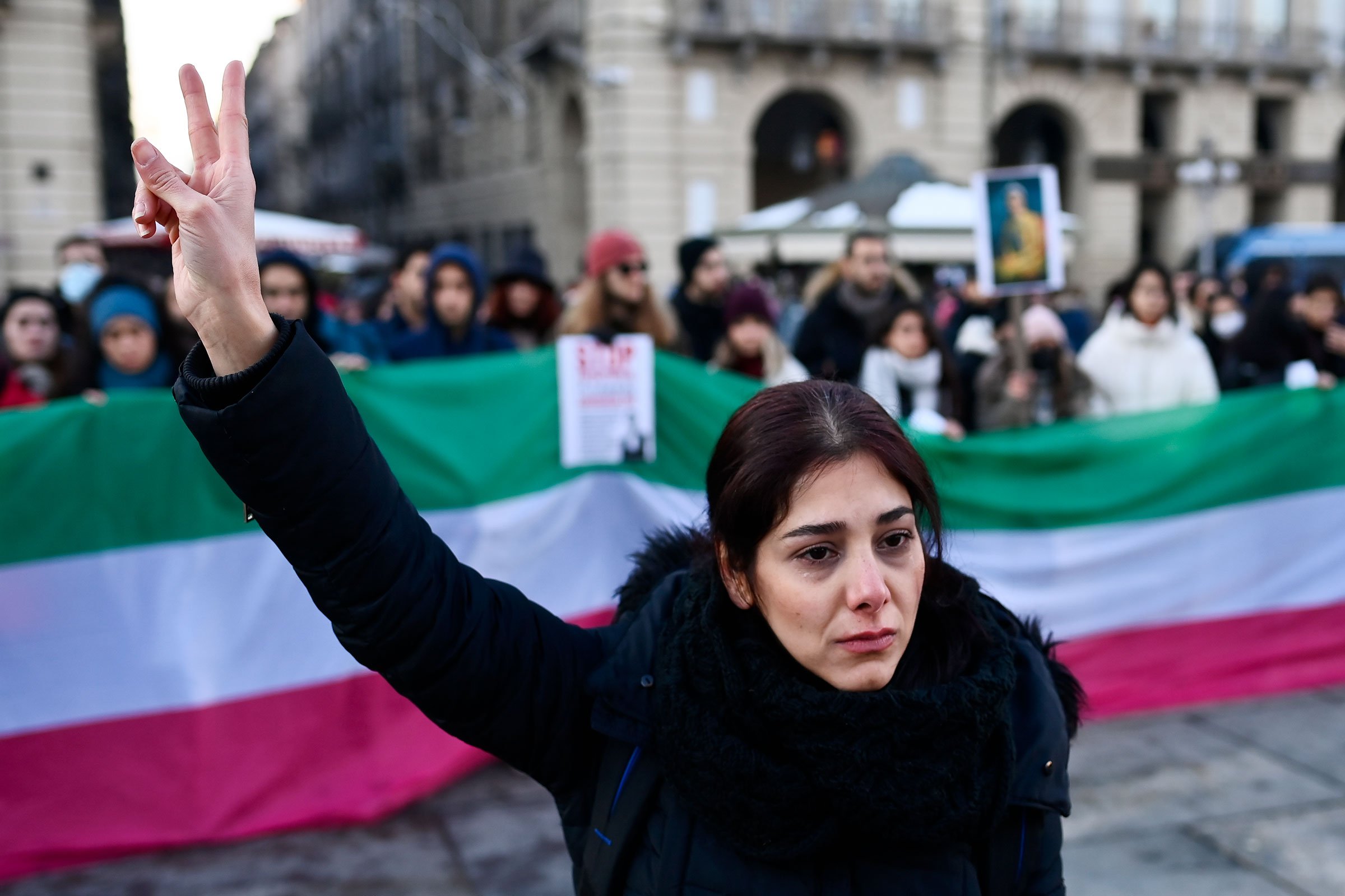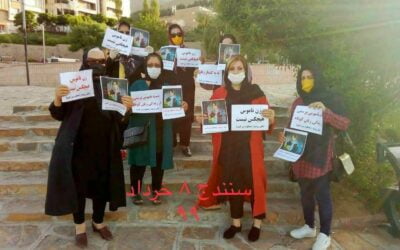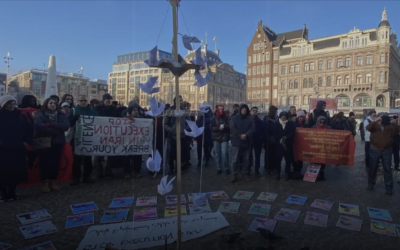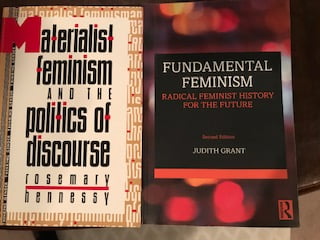Originally published by
There is much that the global feminist movement can learn from the current women’s struggle in Iran and their vision.
- Published
On International Women’s Day, the world is at a turning point. On the one hand, we are facing the global rise of authoritarianism and fascism. On the other hand, popular uprisings for a democratic existence against authoritarianism and imperialism have been emerging in various parts of the world, with popular resistance persisting from Myanmar to Sudan and from Ukraine to Iran.
Women and trans people in the U.S. have suffered a heavy blow with the U.S. Supreme Court’s repeal of the federal right to an abortion, and the intensifying effort of the Republican right wing to repeal or severely limit abortion rights in various states. At the same time, women in Latin America — specifically in Argentina, Chile, Colombia and Mexico — have made some important gains in decriminalizing abortion and expanding reproductive rights as part of a broader social justice movement that involves working-class women, including Indigenous women.
Iran has been on the front lines of active organizing by women who have been leading a popular and mostly youth uprising, which was set off by the September 16 Iranian state police murder of a young Kurdish woman, Zhina Mahsa Amini, for her “improper” hijab. This uprising continues to manifest itself in different ways and faces increasingly brutal state repression. It represents both courage and the effort to articulate specific feminist demands.
Iranian Feminists and Labor Activists Articulate Emancipatory Demands
The latest manifestation of the misogyny that seeks to hold Iranian women back has been the systematic and nationwide poisoning of school girls. Since early December 2022, over 1,000 schoolgirls in over 50 schools around the country have become sick with symptoms of nerve gas poisoning. In the lead-up to today, various teachers’ groups, student groups and women’s groups have issued calls to protest the poisoning and to honor International Women’s Day. Feminist and labor groups have also been issuing various statements of demands to articulate their perspectives for a future democratic Iran. These statements have called for free and equal quality education for women and men at all levels without any gender segregation; women’s equal participation in the social, political and economic sphere; reproductive and abortion rights; divorce and custody rights; banning female genital mutilation, child marriage and polygamy; criminalizing gender violence and sexual harassment; categorizing domestic work as onerous labor requiring better compensation; and legal and health services for incarcerated women.
Some feminists have argued that demands cannot be left at the minimum civil society level but must include human rights, including oppressed national, religious and sexual minorities as well as migrants (mostly Afghans); and to advocate social justice and positive discrimination (affirmative action). Some have also opposed any call for the legalization of sex work but advocate decriminalizing sex workers. These feminists oppose exploitation and specifically exploitation of working women while also advocating for the socialization of domestic labor.
The result of the above feminist efforts and the collaboration of feminist and labor unions inside Iran has been a remarkable statement of demands entitled “The Statement of Minimum Demands of Independent Iranian Unions and Civil Society Organizations.” Dated February 14, 2023, it coincides with the 44th anniversary of the 1979 Iranian Revolution. This statement declares:
The Woman, Life, Freedom Movement is a foundational movement to protest the current state of the country. It is a movement against misogyny, gender discrimination, endless economic insecurity, enslavement of the labor force, poverty, misery, class oppression and oppression against national and religious minorities. … This movement is aimed at permanently ending the formation of any power from above, and marks the beginning of a modern and human social revolution for the emancipation of the people from all forms of oppression, discrimination, exploitation, tyranny and dictatorship.
The “minimum demands” articulated in this declaration include an end to the death penalty and the immediate release of all political prisoners. They also include:
immediate legal equality of women and men in all political, economic, social, cultural and familial arenas. The unconditional abolition of all discriminatory laws and customs against sexual and gender identity and orientation, the recognition of the rainbow LGBTQ+ community, decriminalization of all gender identities and orientations, and unconditional adherence to all the rights of women to control their own body and their own future without any patriarchal control.
Subsequently, a group of Iranian women’s rights activists inside Iran issued a statement for International Women’s Day in which they emphasize that gender discrimination is rooted in the continuation of capitalist patriarchy. They affirm many of the demands raised by the statement of minimum demands cited above. They also state that the current movement has gone beyond demanding anything from the government which is bound to fail. They challenge all institutions of power, whether the Islamic Republic or monarchy, and pursue radical and structural changes, including the following: The right to choose one’s attire, living wages, complete reproductive and abortions rights, free education, free health care, and care for the elderly and people with disabilities.
The above developments are clearly impressive and mark a leap in Iranian society. At the same time, the forces of counterrevolution are powerful, both in the form of the brutal militarized capitalist state of the Islamic Republic and in the form of a coalition headed by Reza Pahlavi, the son of Mohammad Reza Pahlavi, the authoritarian monarch who was deposed by the 1979 Revolution. Both forces are using their capital, power and international connections. One side wants to completely destroy the current uprising through brute force. The other is offering secular Iranian nationalism as the alternative while paying lip service to diversity.
Expanding the Vision of the Global Feminist Struggle
There is much that women around the world can learn from the current women’s struggle in Iran. While Iranian women have not yet succeeded in creating a feminist revolution, they have posed some critical questions and challenges for global feminism.
The slogan, “Woman, Life, Freedom” which has become the motto of the current uprising, is affirmative. It invites feminists to offer an emancipatory vision of the future. The young women protesting, getting shot, blinded, arrested, raped, and sometimes killed are mostly working-class and marginalized women of color. Some of them do not fit the gender binary. They have suffered from over 40 years of a militarized capitalist and religious fundamentalist state. They refuse to allow the concept of life to be taken over by the extreme right in its effort to push women back into having more and more babies.
They are also not satisfied with liberal feminism’s language of “choice,” careerism and self-interest. Rather, what many Iranian women demand is a human existence based on self-determination, collective solidarity, emancipated labor and education, and an end to state and gender violence, which they see as intertwined.
As I have laid out in more depth in my book, Socialist Feminism: A New Approach, confronting racist patriarchal heteronormative capitalism today demands developing a humanist alternative to alienated labor and redefining humanity’s relationship with itself and with nature. And to do so effectively, we would all do well to delve more deeply into a rich body of socialist feminist ideas ranging from social reproduction theories to theories of alienation, Black feminist intersectionality, abolitionism and queer theories. Critically exploring and evaluating these ideas can give us a foundation for addressing the question of how to transcend capitalism, racism, sexism and heterosexism, both at the structural and at the personal level.
Building International Feminist Solidarities
When the #MeToo movement founded by Black feminist abolitionist Tarana Burke became a global movement in 2017, there was much hope that global feminism would reach a new level both qualitatively and quantitatively. The #MeToo movement revealed that women — no matter how successful, whether in the corporate world or in academia — are still seen as sexual objects to be used and abused. The #MeToo movement offered the possibility of dismissing the myth of capitalist “choice” and “empowerment” that did much damage to the women’s movement in the 1980s and 1990s. It potentially revealed the inseparability of capitalism and patriarchy.
It also created a fertile basis for new feminist theorizing and organizing to offer an alternative to capitalism’s dehumanization and commodification of women and people who do not fit the gender binary.
Developing such an alternative still remains the challenge today, when the intersection of gender and state violence continues to grow and promote mass rape, incarceration and femicide, from Ukraine to Xinjiang and from Afghanistan to Ethiopia.





